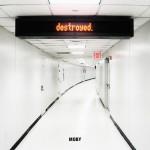
Moby Destroyed
(Little Idiot)
What is there left to say about Richard Melville Hall that hasn't already been said? Every imaginable insult relating to his prolific advert sound-tracking has already been thrown in his direction, and thanks to his tendency to over-share in interviews, we know far more about his personal life than is comfortable. With his brand of tasteful electronica getting quite stale over the years, there's not much that can be said about his music either.
But early word for album number ten, Destroyed, suggested that the latter was about to change. Described by Hall as 'broken down melodic electronic music for empty cities at 2 a.m', and apparently written as a result of insomnia while on tour, there was the promise of Moby's tasteful electronica (it's fair to say that he won't return to the bonkers techno of Feeling So Real again, let alone the punk rock of Animal Rights) at least being rendered slightly chaotic and glitchy thanks to the artist's precarious state of mind when creating them, and the collection of knackered old analogue synths he used to record them on.
That proves to be the case on Destroyed's first few tracks. Sevastopol may sound oddly like Atlantic Ocean's 1994 hit Waterfall (still just as annoying seventeen years later), but it does manage to combine the predicted glitchiness with the big soaring synths and diva-y vocals that he's known for. And Be the One marks an interesting experiment for him, built around vocodered sentiments like 'I was the hell that you needed', it's the bleakest thing that he's done in a long time.
By track four however, it all goes a bit wrong or, to be more accurate, a bit Dido, as Moby hits on the style of one of the few artists more derided than him for blandness and manages to create a domestic drama so unimaginative and monochrome that it's fairly indistinguishable from her work. And on its heels comes Rockets, with its monotonous vocal loop of 'That's alright' like a self-help tape stuck on repeat and The Day, which is just a wonky version of We Are All Made of Stars without the euphoric hook. It seems completely appropriate that these tracks were written in airport lounges and hotel rooms as all they provide is featureless background music for corporate environments.
He does, fortunately, pull things back towards the end of the album, even if it does find him frequently recycling ideas, not just from earlier in his career (such as the very early 90's ravey electric piano of the still very enjoyable Victoria Lucas), but from earlier in the album (After is another bit of vocoder work similar, but inferior, to Be the One). The only thing particularly new here is Stella Maris, an echoing combination of strings and soprano that's closer to classical music than electronica, even if it is lacking a bit in melody.
If, however, Destroyed is taken as less a description and more a listening recommendation the album starts to come into its own. It may be easy to sneer at when listened to when sober, but stick it on when drunk or stoned (or, as Moby probably intended, when sleep-deprived or jet-lagged) and the slow-burn of tracks like The Violent Bear It Away and Lacrimae prove incredibly effective at tugging on the heart-strings.
Despite a fairly catastrophic mid-album dip in quality, there are enough of the big soaring numbers, and a smattering of new ideas to see him through. So it's just like most other Moby albums really.
2 June, 2011 - 08:32 — Mark Davison